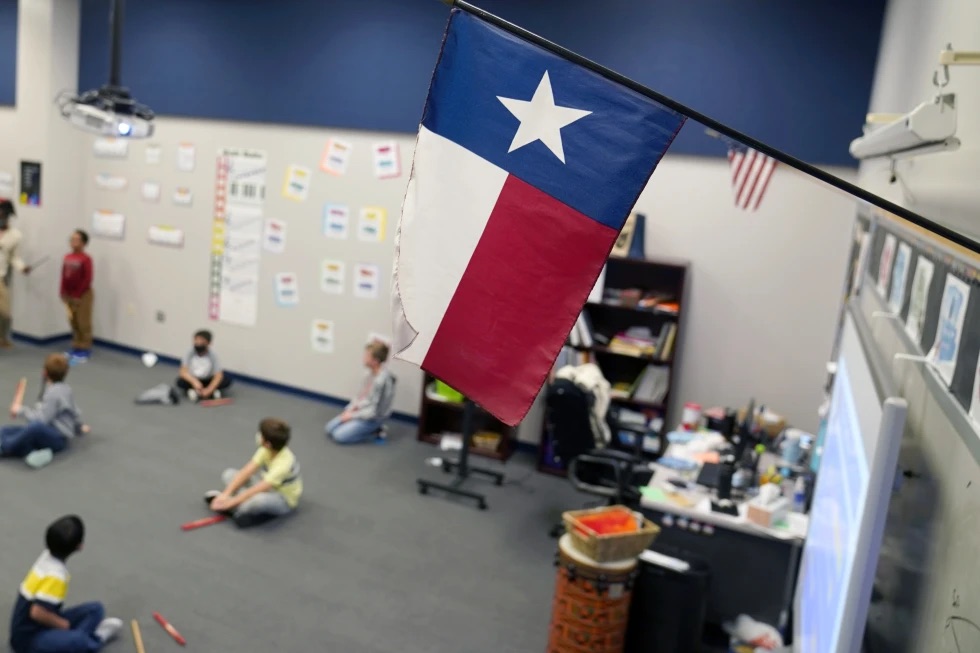
(RNS) — Last Friday (Nov. 22), the Texas State Board of Education narrowly approved a new elementary school curriculum that has drawn widespread criticism for favoritism toward Christianity. The criticism is warranted, but it’s nonetheless unlikely that courts will find the Bluebonnet Learning Program an unconstitutional establishment of religion.
Why? It is at once more innocuous and more insidious than recent moves in adjacent states to inject (Judeo-)Christian religion into public education.
It shouldn’t be hard for the courts to turn thumbs down on Louisiana’s mandate that every public classroom in the state display a specific version of the Ten Commandments and Oklahoma’s mandate that every public classroom be equipped with a Bible and every public schoolteacher teach from it.
But how will judges address a program that, for example, teaches kindergartners to count by having them number the biblical days of creation? Or consider the program’s fifth grade language arts unit on Christian apologist C.S. Lewis’ novel “The Lion, the Witch and the Wardrobe.” On the one hand, it’s a classic, widely read and named one of the 100 best young adult books of all time by Time magazine. On the other, it’s a straight-up allegory of the Crucifixion.
Here’s how the latter is described in the teacher’s guide:
One critical element to analyzing The Lion, the Witch and the Wardrobe is considering how biblical allegories were used by C.S. Lewis to convey messages. Thus, analysis of the author’s purpose for these allegories involves multiple lessons with content that references the Hebrew and Christian Bibles.
Here’s what Grace, a former student of mine who did her primary and secondary education at a Christian academy in Fort Worth, Texas, had to say in a recent email:
Yes, I remember reading the Lion, the Witch, and the Wardrobe in 5th grade…We were explicitly taught that it was Christian allegory, and it wasn’t lost on me that certain types of fantasy were okay while others weren’t. Some kids weren’t allowed to watch things with witches growing up, and I felt odd about reading Harry Potter in school for fear that they would think I was a witch…which is odd to write now, but that’s how I felt in 4th grade. Either way, CS Lewis was a Christian legend, and any of his books were safe.
Altogether, Grace added, “the curriculum does feel like what I grew up with.”
Which seems precisely to be the point. The Bluebonnet Learning Program gives the state’s public school districts permission to provide the kind of education that’s on offer in private Christian academies. It’s just like the new Texas law that permits public schools to hire unlicensed religious chaplains as counselors.
To be sure, in both cases school districts can opt not to do what’s been permitted. But the state will provide a financial benefit for adopting Bluebonnet. And I’d be surprised if an unlicensed religious chaplain can’t be hired for less than a licensed school counselor.
Be that as it may, my favorite part of the Bluebonnet program is the fifth grade unit “Juneteenth and Beyond.” Constructed to include the Civil Rights Movement as well as the end of slavery, the unit includes selections from Martin Luther King Jr.’s famous “Letter From Birmingham Jail,” among which is:
Of course, there is nothing new about this kind of civil disobedience. It was evidenced sublimely in the refusal of Shadrach, Meshach and Abednego to obey the laws of Nebuchadnezzar, on the ground that a higher moral law was at stake. It was practiced superbly by the early Christians, who were willing to face hungry lions and the excruciating pain of chopping blocks rather than submit to certain unjust laws of the Roman Empire. … In our own nation, the Boston Tea Party represented a massive act of civil disobedience.
What follows is a discussion of King as a Christian preacher and an account of the story of Shadrach, Meshach and Abednego from the Book of Daniel that is longer than all the selections from the Birmingham letter.
As for that ellipsis signifying that the program omitted something between “Roman Empire” and “In our own nation,” the missing words are these: “To a degree, academic freedom is a reality today because Socrates practiced civil disobedience.” Socrates, need I note, was a fifth-century B.C.E. Greek philosopher.
Last spring, a new Texas law restricted and weakened tenure at the state’s public universities. Earlier this month, teachers at the University of Texas were told that they would be under “intense scrutiny” because of another new law, which bans diversity, equity and inclusion offices, training and statements at public universities.
Don’t get me wrong. I’m all for helping fifth graders in Texas understand King’s reference to Shadrach et al. But it might be even more important for them to learn something about a subject the Bluebonnet program keeps out of school: academic freedom.
